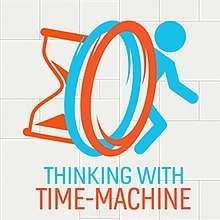Thinking with Time Machine
| Thinking with Time Machine | |
|---|---|
 | |
| Developer(s) | Stridemann |
| Publisher(s) | SignHead Studio |
| Engine | Source |
| Platform(s) | Windows, OS X, Linux |
| Release | April 18, 2014 |
| Genre(s) | Puzzle platformer |
| Mode(s) | Single-player |
Thinking with Time Machine is a single-player mod for Portal 2 developed by Ruslan Rybka, also known as Stridemann, and released by SignHead Studio. It was initially released to Steam on April 18, 2014, for Microsoft Windows, OS X, and Linux systems, available freely to users who own Portal 2 on Steam.
Gameplay
Like in Portal, Thinking with Time Machine gives the player the Portal gun, and puts them in the same environments and with many of the same testing elements. However, the player now also has a device known as the "time machine". The device allows the player to record their movements, and summon a double who performs those motions.
Most of Portal 2's testing elements are included here, but there's a new instruction board showing new test ideas. For example, it shows that crouching down as a double will let you stand on it. If it stops crouching when you're on it, you will be pushed up a little and can jump higher.
Reception
Alice O'Connor of Rock, Paper, Shotgun said of Thinking with Time Machine "For those lacking in some of the social niceties, it’s perhaps the closest we’ll get to playing Portal 2 co-op.”[1]
References
- ↑ O'Connor, Alice (2014-04-23). "Portal 2 Mod Adds Time-Travelling Legs". Rock, Paper, Shotgun. Retrieved 2017-11-09.
- "Portal 2 mod Thinking With Time Machine now available on Steam". pcgamer. Retrieved 2017-11-11.
- "Mod of the Week: Thinking With Time Machine, for Portal 2". pcgamer. Retrieved 2017-11-11.
- "This Portal 2 Mod Lets You Play Against Yourself". WIRED. Retrieved 2017-11-11.
- Good, Owen S. (2014-04-26). "Mod adds time travel to Portal 2". Polygon. Retrieved 2017-11-11.
- Haywald, Justin (2014-04-27). "What We'd Like to See in the Next Portal". GameSpot. Retrieved 2017-11-11.
- "Steam Gauge: Measuring the most popular Steam games of 2014". Ars Technica. Retrieved 2017-11-11.
